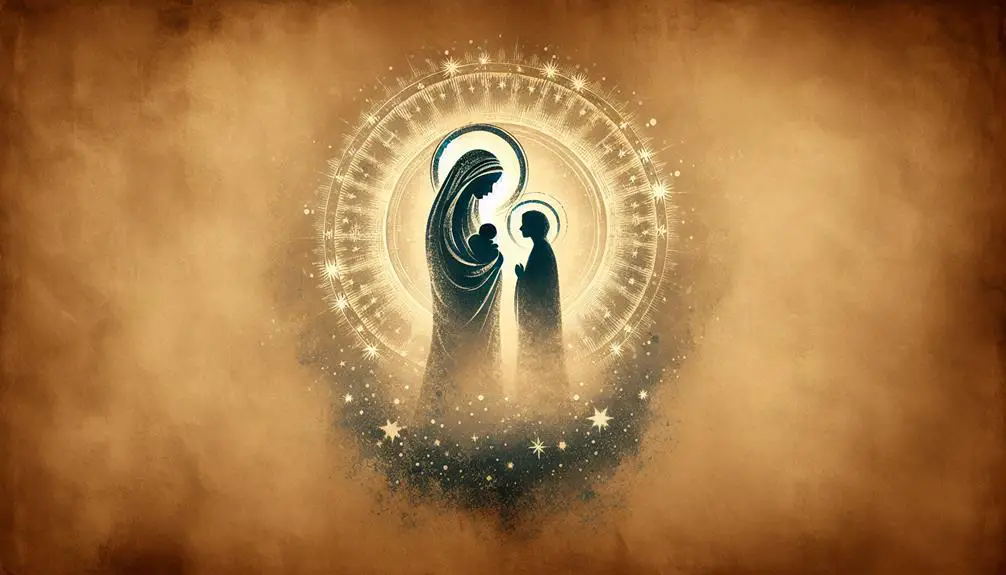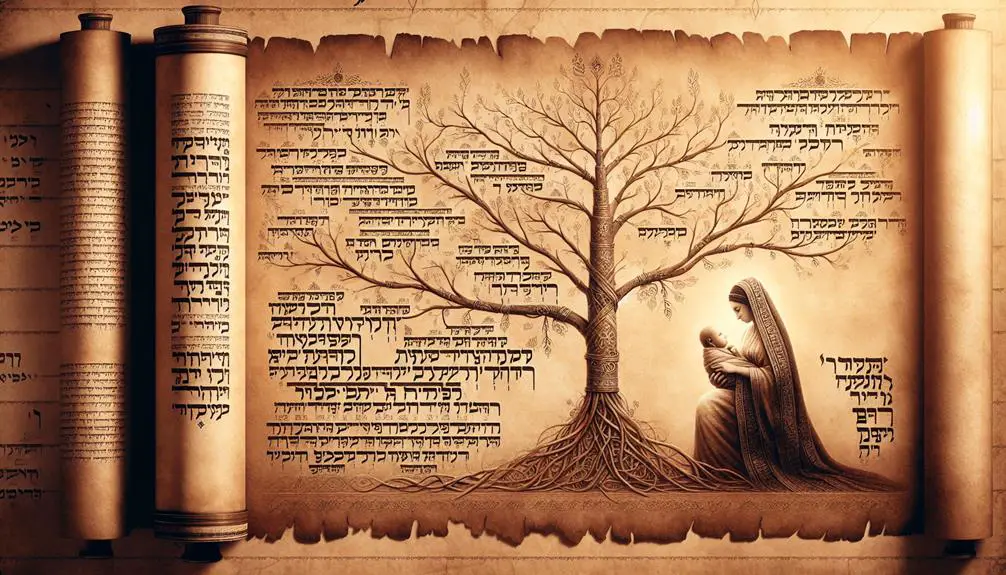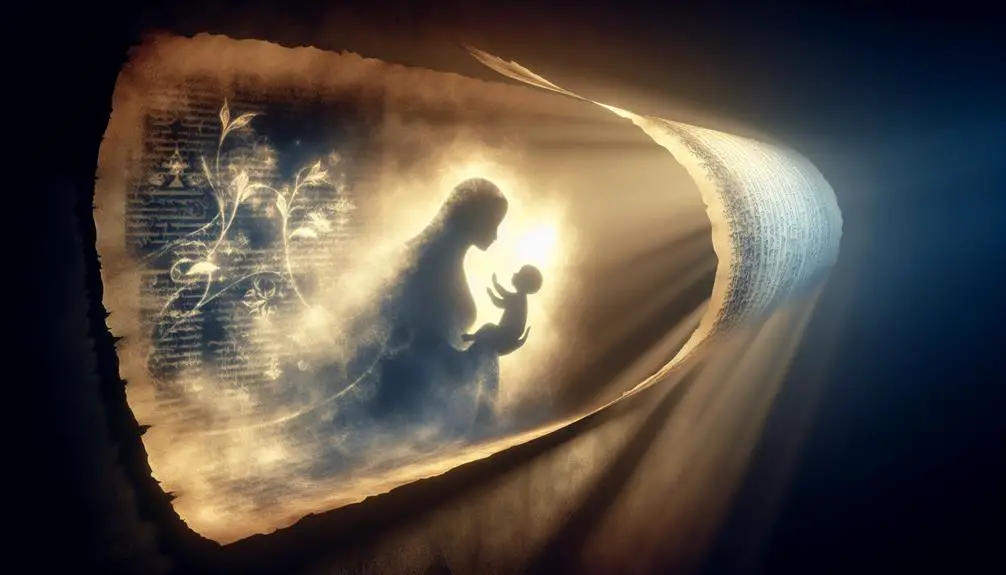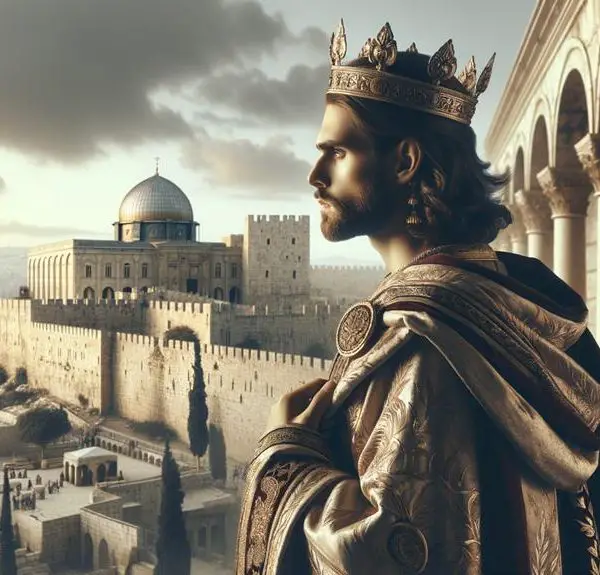Journey into the mystery of Mary's lineage to discover if the Bible sheds light on her mother's identity.

Is Mary's Mother Mentioned in the Bible
You've pondered the stories of the Bible, you've traced the genealogies of its key figures, but have you considered the lineage of Mary, the mother of Jesus?
The Bible, a rich tapestry of historical and spiritual narratives, subtly references figures pivotal in the unfolding of its divine story, yet leaves much to the imagination regarding Mary's own ancestry. While the text does not explicitly mention Mary's mother, exploring this question opens a fascinating dialogue about tradition, apocryphal texts, and the implications for our understanding of sacred history.
Let's embark on this journey together, uncovering layers of tradition and scripture that may illuminate this intriguing aspect of biblical history.
Key Takeaways
- The Bible does not explicitly mention Mary's mother or provide her name.
- Apocryphal texts and traditions identify Saint Anne as Mary's mother.
- Scriptural silence on Mary's maternal lineage emphasizes her theological role over genealogical specifics.
- Exploration of Mary's lineage, including Saint Anne, enriches understanding of her significance in Christian faith.
The Quest for Mary's Lineage

Unraveling Mary's lineage presents a complex journey through historical and biblical narratives, shedding light on her unique role and heritage within Christian tradition. You delve into genealogical methods that are both meticulous and exhaustive, aiming to trace Mary's relatives and ascertain her familial background. This quest isn't merely about listing names; it's an analytical endeavor that seeks to understand the connections and societal structures of the time.
Genealogical methods involve scrutinizing ancient texts, deciphering lineage patterns, and correlating familial ties within the broader context of Jewish and early Christian communities. You're navigating a labyrinth of historical records, oral traditions, and theological interpretations, all while maintaining a critical eye for detail and accuracy.
The identification of Mary's relatives requires piecing together fragments of information from various sources, employing both deductive reasoning and scholarly insight. This process underscores the importance of genealogy in understanding religious figures, offering insights into their lives, influences, and the social fabric they were part of. Your analysis not only illuminates Mary's heritage but also enriches the tapestry of Christian history, providing a deeper appreciation for the interconnectedness of biblical narratives and genealogical roots.
Biblical References Explored

Delving into biblical references, you'll find that Mary's lineage is subtly hinted at through a tapestry of scriptures, each contributing to a nuanced understanding of her familial background. Mary's portrayal in the Bible is complex, shaped by both what is said and the profound scriptural silence on certain aspects of her life, including details about her mother.
Reference |
Significance |
|---|---|
Luke 1:26-38 |
Annunciation narrative offers insights into Mary's immediate context, not her lineage. |
Matthew 1:16 |
Mentions Mary as part of Jesus' genealogy, yet omits maternal ancestors. |
Luke 3:23-38 |
Traces Jesus' lineage through Joseph, indirectly touching on Mary's connection. |
"Daughter of Zion" |
A symbolic reference potentially alluding to Mary's spiritual heritage, not specific relatives. |
This table underscores the scriptural silence on Mary's maternal lineage, inviting a deeper contemplation of her portrayal. The Bible, focusing on theological narratives and spiritual ancestries, often leaves earthly familial details to the imagination. This absence in the scripture does not diminish the significance of Mary's role but rather emphasizes the broader theological and symbolic importance of her character within the biblical narrative.
Apocryphal Texts Insight

Turning our focus to apocryphal texts, we find they offer tantalizing glimpses into Mary's maternal lineage, absent from canonical scriptures. These documents, while not included in the Bible as it stands today, provide a rich tapestry of tradition and lore surrounding the figure of Mary and, by extension, her mother, known as Saint Ann in later Christian tradition.
The Gnostic Gospels, for example, are a collection of early Christian texts that diverge significantly from the canonical Gospels in theology and narrative. Within these texts, we encounter a more mystically inclined Christianity, one that often emphasizes the role of women in early Christian communities.
Saint Ann's presence is implied rather than explicitly detailed in these apocryphal writings. Yet, the reverence for her character is palpable, suggesting an early and widespread veneration that predates many of the canonical declarations about Mary and her lineage. This insight challenges the conventional understanding of Mary's background, inviting scholars and the faithful alike to ponder the depth and diversity of early Christian traditions.
Tradition and the Virgin's Mother

Exploring the traditions surrounding the Virgin's mother reveals a complex tapestry of devotion and historical narrative that has shaped Christian understanding for centuries. Central to this tradition is Saint Anne, revered as the mother of Mary and, consequently, the grandmother of Jesus Christ. Her story, though not found within the canonical texts of the Bible, has been embraced by the faithful, illustrating the depth of Marian devotion.
Saint Anne's role transcends mere genealogy; she embodies virtues of faith and patience, serving as a model for believers. Her veneration isn't merely a reflection of her biological connection to the Virgin Mary but a recognition of her own sanctity and role in the divine story of salvation. Marian devotion, deeply rooted in the Christian tradition, finds an additional dimension in Saint Anne, enriching the spiritual landscape.
This reverence for Saint Anne highlights a broader phenomenon within Christian spirituality, where figures not explicitly mentioned in the Bible are nonetheless integral to the faith's narrative fabric. Through Saint Anne, believers find a figure of maternal strength and faith, expanding the context of Marian devotion and illustrating the nuanced ways tradition informs and enriches spiritual understanding.
Historical and Theological Context

You'll find that exploring the biblical references concerning Mary's mother offers a rich tapestry for understanding early Christian narratives.
Analyzing these theological implications allows you to grasp the broader socio-religious context of the time.
This approach not only deepens your comprehension of Marian devotion but also illuminates the intricate relationship between historical events and theological development.
Biblical References Explored
Numerous biblical passages provide insights into Mary's lineage and her pivotal role within the theological framework of Christianity. While Mary's mother isn't directly mentioned, these texts offer a rich tapestry of understanding, especially when considering Mary's occupation and Joseph's perspective.
- Mary's Occupation: Scripture subtly references Mary's daily life, implying her deep-rooted faith and devotion, which set the stage for her unique role.
- Joseph's Perspective: The Gospels provide a glimpse into Joseph's thoughts and feelings, enriching our understanding of Mary's environment and familial dynamics.
- Lineage and Legacy: Passages tracing Mary's genealogy highlight her significance in fulfilling Old Testament prophecies, underscoring her central role in salvation history.
These elements collectively deepen our appreciation of Mary's contribution to Christianity's narrative, illuminating her through both historical and theological lenses.
Theological Implications Analyzed
Delving into Mary's story within biblical scripture reveals profound theological implications, shedding light on her role across both historical and sacred narratives. The concept of Divine Maternity sits at the heart of understanding Mary's significance, tying directly into the fabric of Marian Devotions.
Aspect |
Impact on Theology |
|---|---|
Divine Maternity |
Affirms Mary as the Mother of God, highlighting her unique role in salvation history. |
Marian Devotions |
Encourages a deeper spiritual connection and reverence towards Mary, influencing Christian practice and piety. |
Historical Context |
Provides a backdrop to appreciate the evolution and depth of Marian theology. |
These elements collectively contribute to a richer, more nuanced appreciation of Mary's place within the Christian faith, urging you to explore her story and its implications further.
Analyzing Genealogical Records

In analyzing genealogical records, one must meticulously examine the textual and historical context to accurately identify Mary's maternal lineage. This process involves sifting through ancient texts and leveraging modern tools such as genetic research. The findings not only enrich our understanding of biblical narratives but also carry contemporary implications for how we interpret these historical figures today.
Consider the following points to deepen your understanding:
- Genetic research has revolutionized our approach to biblical genealogies, offering insights that were previously inaccessible. This has opened new avenues for understanding Mary's ancestry and its significance.
- The historical context of genealogical records in the Bible provides a rich tapestry of cultural and familial connections, highlighting the importance of lineage in ancient societies.
- Contemporary implications of this research extend beyond academic curiosity, touching on issues of identity, heritage, and the role of women in religious narratives.
As you delve into these aspects of genealogical analysis, remember that the pursuit isn't just about tracing lineage but also understanding the broader implications of these findings on our contemporary interpretation of biblical narratives.
Reflections on Sacred Ancestry

You must recognize that Mary's lineage, as outlined in biblical texts, significantly shaped her role and identity within the sacred narratives. An exploration of her genealogy reveals the profound influence of her ancestors, not only on her personal spirituality but also on her pivotal role in religious history.
Understanding the significance of this spiritual heritage offers deeper insights into the interconnectedness of familial and divine narratives in the Bible.
Ancestral Influence on Mary
Reflecting on Mary's sacred ancestry unravels the profound influence her forebears had on her spirituality and role within biblical narratives. Family dynamics and cultural influences are pivotal in understanding how ancestral ties shaped her. Delving into this lineage, you'll find:
- The importance of family dynamics in nurturing faith and resilience.
- How cultural influences of the time enriched her understanding of divine roles.
- The legacy of piety and devotion passed down through generations, setting a foundation for her spiritual journey.
This analysis offers a nuanced perspective on Mary's character, emphasizing the significant impact of her ancestors. It's not just about tracing lineage but understanding how these elements contributed to her development as a central figure in biblical stories.
Biblical Lineage Exploration
Delving into the sacred ancestry of Mary reveals a rich tapestry of biblical lineage that profoundly shaped her spiritual identity and destiny. Genealogical methods illuminate these ancestral narratives, underscoring the significance of lineage in the biblical context.
Genealogical Method |
Application in Mary's Lineage |
|---|---|
Scriptural Cross-Reference |
Identifies ancestors not explicitly mentioned |
Patrilineal Emphasis |
Highlights male lineage, though maternal lines are crucial |
Ancestral Naming Patterns |
Suggests familial connections and heritage |
Oral Tradition Analysis |
Preserves and validates unwritten lineage stories |
Spiritual Heritage Significance
The spiritual heritage of Mary, as revealed through her biblical lineage, offers profound insights into the shaping of her divine role and mission. This sacred ancestry not only underscores her pivotal place within the Christian narrative but also enriches modern interpretations and feminist perspectives of biblical women. Analyzing Mary's lineage uncovers layers of spiritual and cultural significance that have shaped religious thought and practice.
- Modern interpretations explore how Mary's heritage informs contemporary Christian identity and spirituality.
- Feminist perspectives highlight the empowerment of women through the examination of Mary's lineage in biblical narratives.
- Cultural significance of Mary's ancestry in shaping the traditions and teachings of the Christian faith, highlighting the interplay between historical context and spiritual development.
This analysis offers a nuanced understanding of the importance of spiritual heritage in biblical stories.
Frequently Asked Questions
How Do Contemporary Christian Denominations View the Significance of Mary's Mother in Their Liturgy and Religious Practices?
You'll find that contemporary Christian denominations vary in their views on Mary's mother's significance in liturgy and religious practices. While not all groups emphasize her role, certain denominations, particularly within Catholicism and Orthodoxy, honor her through feast days and integrate her into theological debates.
These observances reflect deep reverence and contribute to the rich tapestry of Christian tradition, showcasing the varied ways in which believers connect with their spiritual heritage.
Are There Any Archaeological Findings or Historical Artifacts That Have Been Linked to Mary's Mother?
You're diving into a treasure hunt for links between ancient whispers and today's beliefs.
When it comes to archaeological findings or historical artifacts related to Mary's mother, you'll find the trail's a bit cold. Despite thorough genealogical research and digging into scriptural references, there's a noticeable scarcity of physical evidence or artifacts directly connected to her.
This gap challenges scholars to lean on historical texts and tradition for understanding.
How Has the Portrayal of Mary's Mother Evolved in Christian Art and Iconography Through the Centuries?
In exploring the iconographic evolution of Mary's mother in Christian art, you'll notice a significant shift in artistic representation through the centuries. Initially, depictions were scarce and symbolic, reflecting her marginal biblical presence.
Over time, artists began to embody her with attributes of sanctity and maternal grace, enriching her portrayal with theological and cultural nuances. This evolution underscores the dynamic interplay between tradition and creativity in Christian iconography.
Can the Devotion to Mary's Mother Be Traced in Any Non-Christian Religious Traditions or Cultures?
Exploring devotion to Mary's mother across various cultures is like navigating a vast ocean of interfaith similarities and cultural festivals. You'll find that elements of her veneration echo in non-Christian traditions, showcasing a blend of reverence that transcends religious boundaries.
This analysis digs deep into how these connections paint a picture of universal respect and admiration, highlighting the unique, yet shared, spaces she occupies in the hearts of many across different cultures.
What Are the Psychological and Sociological Implications of the Reverence Towards Mary's Mother in Various Communities Around the World?
You're examining how the reverence towards Mary's mother impacts family dynamics and community rituals worldwide. This reverence can strengthen familial bonds, instilling values of respect and veneration that extend beyond the nuclear family.
It also influences community rituals, creating shared experiences that foster a sense of belonging and identity. Analyzing these effects reveals the profound sociological and psychological implications these practices have on communities, shaping both individual and collective identities.
Conclusion
In your journey through scriptures and traditions, like a ship navigating the vast ocean, you've uncovered layers of history and faith surrounding Mary's lineage.
The Bible, while silent on her mother's name, coupled with apocryphal insights and genealogical records, paints a rich tapestry.
This exploration not only deepens our understanding of sacred ancestry but also highlights the interplay between historical facts and theological beliefs.
Thus, Mary's maternal heritage, veiled in mystery, continues to intrigue and inspire scholarly and spiritual reflection.



Sign up